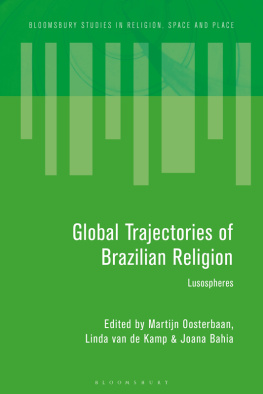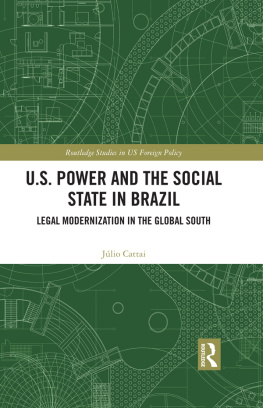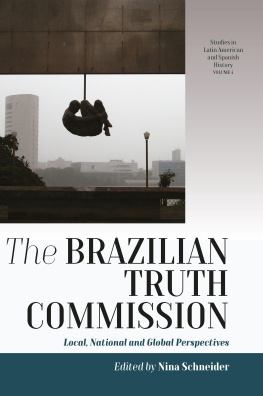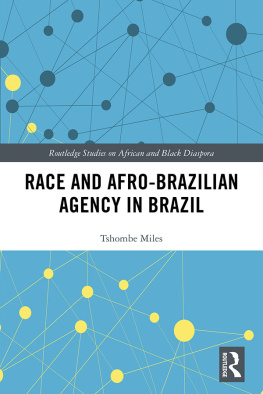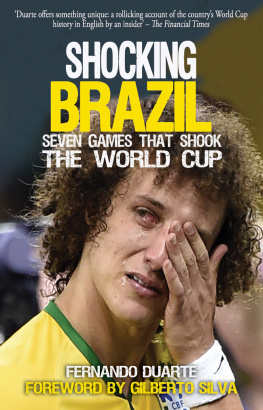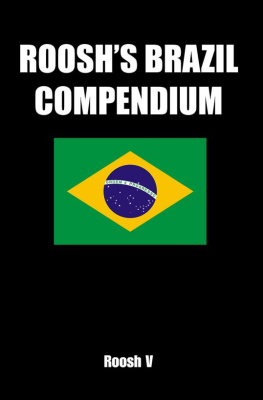Global Trajectories
of Brazilian Religion
Bloomsbury Studies in Religion, Space and Place
Series editors: Paul-Franois Tremlett, John Eade, and Katy Soar
Religions, spiritualities, and mysticisms are deeply implicated in processes of place making. These include political and geopolitical spaces, local and national spaces, urban spaces, global and virtual spaces, contested spaces, spaces of performance, spaces of memory, and spaces of confinement. At the leading edge of theoretical, methodological, and interdisciplinary innovation in the study of religion, Bloomsbury Studies in Religion, Space, and Place bring together and give shape to the study of such processes.
These places are not defined simply by the material or the physical but also by the sensual and the psychological, by the ways in which spaces are gendered, classified, stratified, moved through, seen, touched, heard, interpreted, and occupied. Places are constituted through embodied practices that direct critical and analytical attention to the spatial production of insides, outsides, bodies, landscapes, cities, sovereignties, publics, and interiorities.
Religion and the Global City,
edited by David Garbin and Anna Strhan
Religious Pluralism and the City,
edited by Helmuth Berking, Silke Steets, and Jochen Schwenk
Global Trajectories
of Brazilian Religion
Lusospheres
Edited by Martijn Oosterbaan,
Linda van de Kamp and Joana Bahia

Joana Bahia is Professor of Anthropology at the State University of Rio de Janeiro (UERJ), Brazil, and Associate Researcher at the Interdisciplinary Center for Migration Studies (NIEM) at the Rio de Janeiro Institute for Urban Research and Planning (IPPUR/UFRJ). She coordinates the research laboratory Identities, Migrations and Representations of the Brazilian National Council for Scientific and Technological Development (CNPQ). She has researched and published widely in the areas of religious transnationalization, Afro-Brazilian religions, ethnic identities, and migration.
Andrea Damacena Martins is a postdoctoral research fellow at the Federal University of Pernambuco, Recife (Brazil), in the Department of Cultural Anthropology. Since 2003 she has been living and working as an independent researcher in the Netherlands. Her research interests include Catholicism, Brazilian migration, and transnationalism. She has published several articles and book chapters on religious heritage, cultural diversity, identity, and religious and social practices of Portuguese-speaking immigrants in the Netherlands.
Celso de Brito is Adjunct Professor in the Department of Social Sciences and the Postgraduate Program in Anthropology at the Federal University of Piau (UFPI), Brazil. He earned his doctorate at the Federal University of Rio Grande do Sul (UFRGS), Brazil. He has been a research fellow at the Center for Research in Anthropology, Universidade Nova de Lisboa, Portugal (CRIA/FCSH/UNL), the Tropical Research Institute (IICT), Portugal, and in the Department of Anthropology at Lumire Lyon 2 University, France. His areas of interest include anthropology of Afro-Brazilian populations, anthropology of transnationalism and economic and political anthropologies. He has published numerous journal articles and book chapters in these areas.
Jessica Greganich obtained her PhD in Social Anthropology at the Federal University of Rio Grande do Sul (UFRGS), Brazil, and the Vrije Universiteit Amsterdam, the Netherlands, in collaboration with the Graduate Institute Geneva, Switzerland. Currently she is a postdoctoral researcher at the Federal University of Pernambuco, Brazil. She has done extensive research on ayahuasca religions and religious butinage.
Andrs Serralta Massonnier is Professor at the Holocaust Remembrance Centre of Montevideo, Uruguay. He has researched and published in the areas of Contemporary History, Political Science of Religion, History of Religion, and Genocide Studies. His most recent book is Ensear El Genocidio Armenio: Teora, Metodologa y Didctica (Teaching the Armenian Genocide. Theory, Methodology and Didactics, De La Plaza, 2017, with Marcelo Decena).
Aramis Luis Silva is a visiting professor at the Federal University of So Paulo, Brazil. Focused on political anthropology, social communication, and religion, he has published about museums and ethnographic collections, Catholic missions, and the relationship between religion and sexuality. Concerning religious phenomena, he analyzes the contemporary social forms of subjectivation and the circulation of the categories from which the intersected subjects are constituted of.
Martijn Oosterbaan is Associate Professor of Cultural Anthropology at Utrecht University, the Netherlands. His research is situated at the crossroads of Urban Studies, the Anthropology of Religion, and Media Anthropology, and he has done much research on evangelical and Pentecostal movements in Brazil and beyond. His recent book is Transmitting the Spirit: Religious Conversion, Media, and Urban Violence in Brazil (Penn State Press, 2017), and he is currently starting a project on religious vigilantes in megacities in the Global South.
Cristina Rocha is Professor in Anthropology and Director of the Religion and Society Research Cluster, Western Sydney University, Australia. She is President of the Australian Association for the Study of Religion, and coedits the Journal of Global Buddhism and the Religion in the Americas series, Brill. Her research focuses on the intersections of globalization, migration, and religion. Her most recent book is John of God: The Globalisation of Brazilian Faith Healing (OUP, 2017).
Matan Shapiro is a postdoctoral research fellow in the Department of Social Anthropology at the University of Bergen, Norway. Premised empirically on several fieldwork periods in the Brazilian state of Maranho (20078, 200910, and 2016), and in IsraelPalestine (20045, 201415, 201517) he has written mainly (but not exclusively) on the links between kinship, ritual, and cosmology in the Brazilian and Israeli societies. His current research focuses on techno-utopianism among bitcoin enthusiasts in Tel Aviv, Israel.
Claudia Wolff Swatowiski is Adjunct Professor of Anthropology at the Federal University of Uberlndia, Brazil. She received her PhD in Social Sciences from the State University of Rio de Janeiro in 2010. Between 2007 and 2008, she was a visiting fellow at the Institute of Social Sciences of the University of Lisbon. Her numerous publications in the fields of Religious and Urban Anthropology include her book Novos cristos em Lisboa: reconhecendo stigmas, negociando esteretipos (New Christians in Lisbon: Recognizing Stigmas, Negotiating Stereotypes) (Garamond, 2013).
Kachia Tchio received her PhD in Anthropology in 2011 from the Universidade Nova de Lisboa, Portugal. She is Assistant Professor at the Federal University of Rondnia, Brazil, where she coordinates the Masters Program Teaching Natural Sciences. Her research interests include identity representations, multiculturalism, traditional knowledge, Pentecostalism, and teacher training for science education. She has published various articles and book chapters on these topics.
Linda van de Kamp is a Cultural Anthropologist and Assistant Professor in the Department of Sociology at the University of Amsterdam, the Netherlands. She carries out interdisciplinary research on urban transformations, religion and ritual, transnational circulation, and industrial and cultural heritage. Her current project, titled Yoga, Bingo and Prayer in Urban Regeneration Areas, was awarded with a VENI grant from the Netherlands Organization for Scientific Research (NWO). Linda has done in-depth research on the emergence of Brazilian Pentecostalism in Mozambique. She is the author of
Next page
